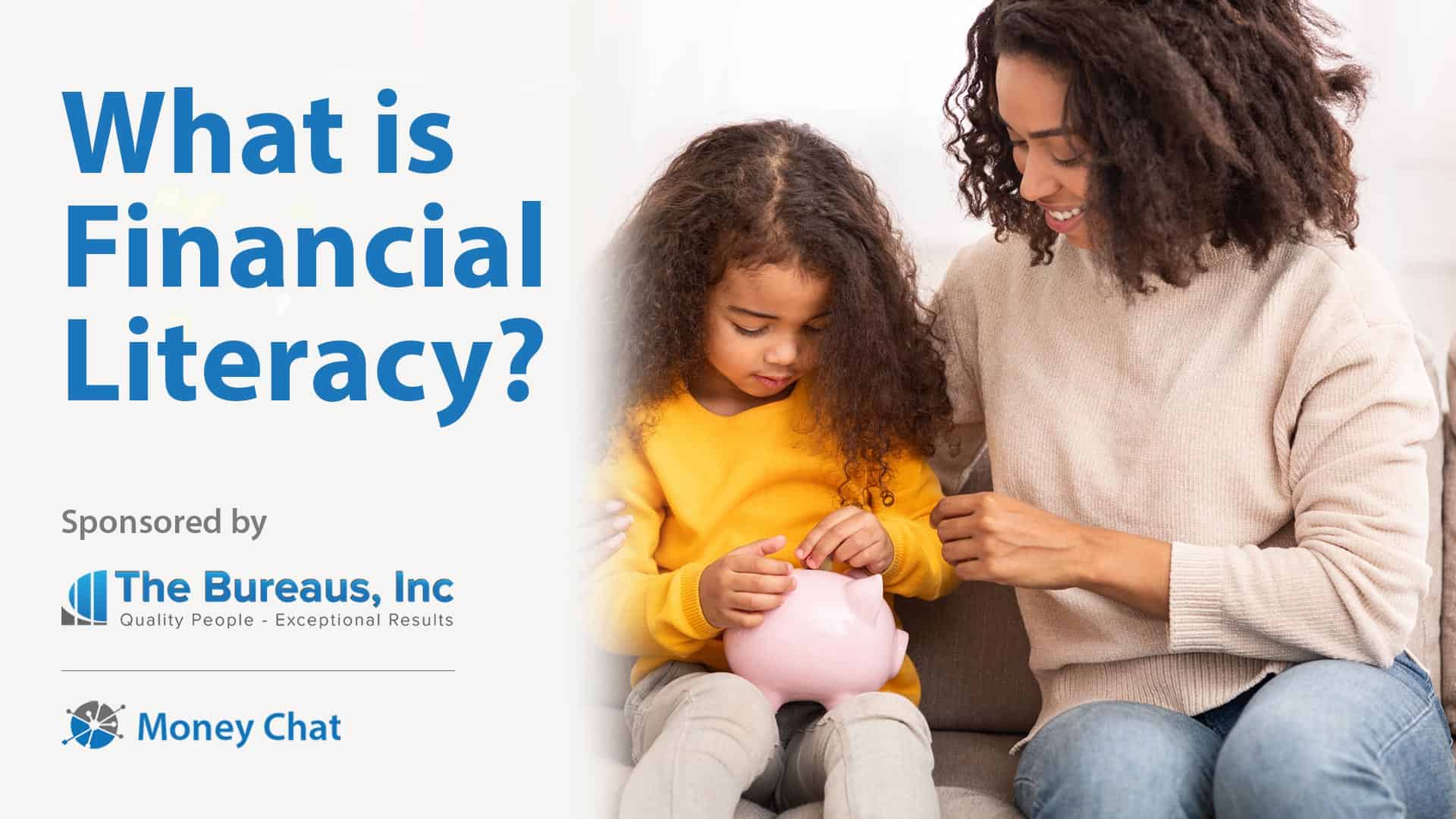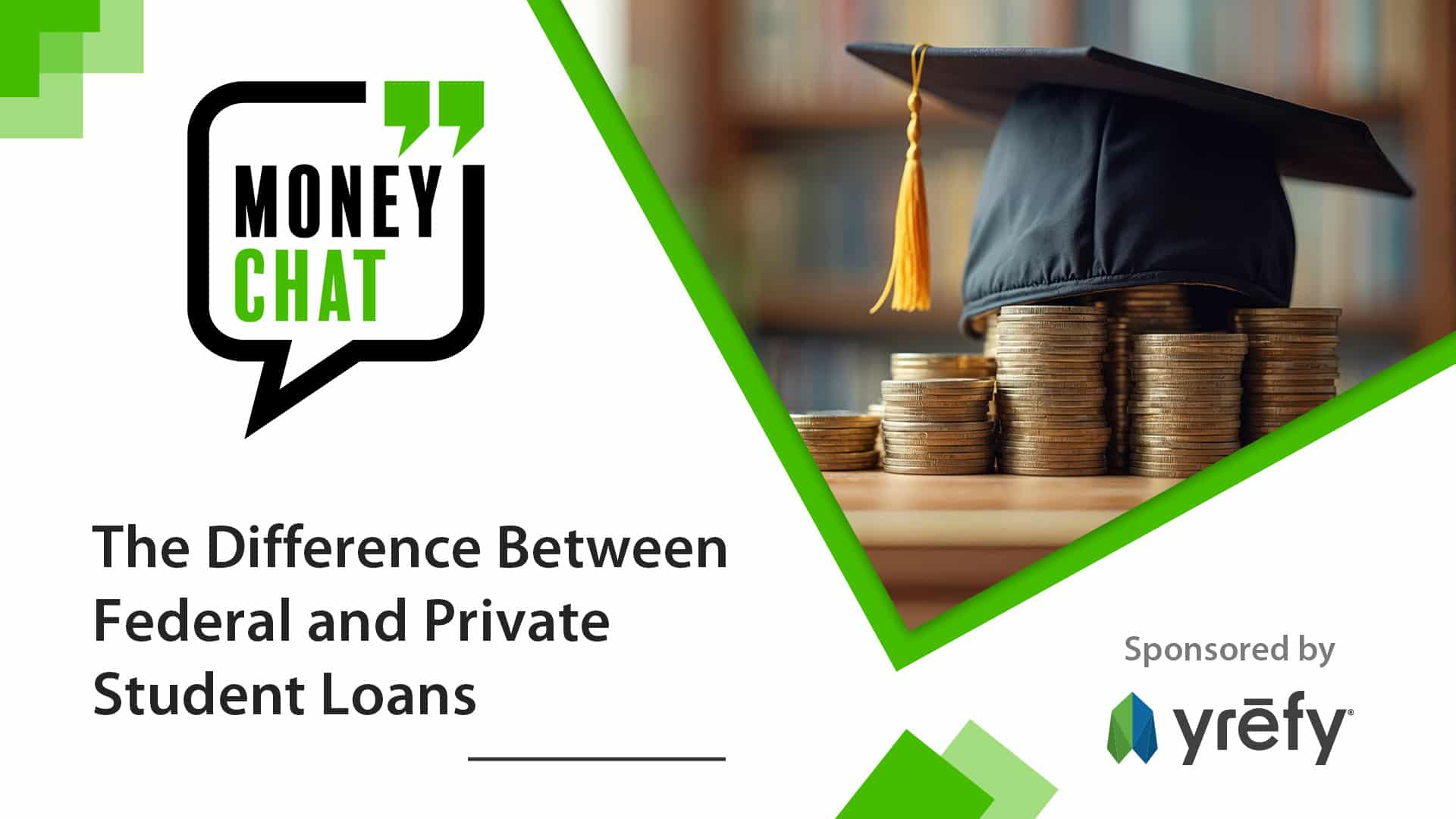
What is Financial Literacy?
Financial literacy is an important part of achieving financial health, but what does it mean for a person to be “financially literate?” What can you do to improve your financial literacy and what are some real-life reasons why thinking about financial literacy is worthwhile?
In this Money Chat, we aim to answer those questions by providing you with a straightforward overview of the meaning of financial literacy, how it applies to you on a personal and everyday basis, and where to find quality free resources for brushing up your finance tools, skills, and knowledge. (These resources are great for sharing with students, teachers, family, and friends, too!)
Financial Literacy Explained
Financial literacy is competency or knowledge relating to finance. More specifically, it’s having a basic understanding of personal finance topics such as credit, debt, saving, budgeting, investing, and making smart spending choices. The National Financial Capability Study considers “aspects of economics and finance encountered in everyday life” to be part of financial literacy, which gets into more complex subjects such as “compound interest, inflation, principles relating to risk and diversification, the relationship between bond prices and interest rates, and the impact that a shorter-term loan can have on total interest payments over the life of a mortgage.” While there’s no single definition, the big idea is that financial literacy is about understanding money and how to handle it well.
Our understanding of these concepts– together with our attitudes and behaviors about money– helps to predict our financial well-being. Our opinions and thoughts about money and how to handle it start early in life as we learn from what we see growing up. Individuals, families, and communities with less understanding or misunderstandings about money tend to pass that misunderstanding down to children. With these advantages or disadvantages being passed down from one generation to the next, breaking a negative financial cycle often takes an intentional effort. That’s why it’s important to talk about financial literacy. With awareness, we can step outside of what we know or think we know and examine, improve, change, or build as needed for greater financial health.
How Does This Apply To Me?
Not everyone wants to live the same way or make the same types of financial choices, and you might even feel this topic doesn’t apply to you; however, whether you’re trying to build wealth, buy a house, or relocate, understanding the ins and outs of your financial options puts you in a better position to research and make the best choices available for any purchasing, saving, investing, or planning you may need to do. On the other hand, consumers with less understanding of personal finance topics are more vulnerable to bad deals, scams, and negative repercussions from lack of financial planning or misinformed financial decisions. That’s why financial literacy matters directly for individuals, families, and businesses.
Larger patterns of cumulative financial decisions can even impact the community and the national economy on a larger scale, such as in the US mortgage crisis of 2007-2010. To help prevent things like this and to help protect consumers, national nonprofit and government organizations such as the Financial Industry Regulatory Authority (FINRA), Consumer Financial Protection Bureau (CFPB), and the National Endowment for Financial Education have gotten involved in recent years to help bridge the knowledge gap for American consumers. There are also many organizations doing similar things in other countries and worldwide, such as the International Network on Financial Education, the Global Financial Literacy Excellence Center, and PYXERA Global. Many educational organizations, financial institutions, and even libraries are also involved in financial education efforts. These organizations and their resources may lead you to practical tools, skills, and knowledge for improving your financial wellness and financial literacy.
What Are the Statistics?
Over the past decade, there have been several National Financial Capability Studies conducted in attempts to measure Americans’ awareness, behaviors, and attitudes about core personal finance topics. While it can be a challenge to measure big ideas like this, especially across large populations, the survey data helps to give a general picture. The survey for measuring financial literacy asked 5 questions, and only about one-third of Americans surveyed answered at least 4 of the 5 questions correctly. These results indicated that most Americans are lacking an understanding of key financial and economic concepts. (If you’d like to test yourself, quizzes are available at usfinancialcapability.org.) The study results also showed that the financial knowledge gap is continuing or even widening amongst younger Americans, people without higher education, and people with lower incomes.
There have also been various worldwide surveys to measure financial literacy. According to the S&P Global FinLit Survey, about half of Americans and only about one-third of people worldwide are financially literate. Survey findings showed that as a group, women are slightly less financially literate than men, as women have historically chosen or been required to depend on men to understand and make major financial decisions (while the financial gender inequality gap in the US has been steadily closing for the past several decades, data proves that women are still adversely affected more significantly than men when it comes to home finance and national economic challenges such as during the Covid-19 pandemic). For these specific groups and all people in general, the data reveals a pressing need to take action to improve the financial outlook for the future.
How Can I Learn More About Finances?
If a shortage of financial literacy is a significant barrier to overcoming generational poverty and patterns of inequality, what can we do about it? Regardless of age, income, or education level, everyone can benefit from increasing their understanding of key financial topics and economic concepts. Financial literacy is often not something many people were taught in school or at home. Until recently, most states did not include personal finance as part of the standard curriculums, and some states are still in the process of adding such curriculums. The good news is more changes are being made in education to help improve this situation for today’s youth and future generations and there are steadily more quality resources being made available at no cost for both students and adults.
Considering that youth are disproportionately affected by unemployment and families are struggling with the effects of reduced income and pandemic-related joblessness, it’s critically important to equip ourselves with the tools to manage money carefully and make well-informed financial decisions. To get started, we’re sharing a few quality free resources below to grow your knowledge or help a student, friend, or family member achieve increased financial literacy:
- Building Wealth: A Beginner’s Guide to Securing Your Financial Future by Federal Reserve Bank of Dallas
- Personal Finance Course by The George Washington University and Global Financial Literacy Excellence Center
- Money Smart Week by Federal Reserve Bank of Chicago
- Economic Lowdown Video Series by Federal Reserve Bank of St. Louis
- Education Resources by National Financial Educators Council
- 360 Degrees of Financial Literacy by American Institute of CPAs
- Family-At-Home Financial Fun Pack by Council for Economic Education
- Financial Literacy Rocks by Receivables Management Association International
- Money Math: Lessons for Life by the Department of the Treasury
- MyMoney.gov by Federal Financial Literacy and Education Commission
As we face the fallout from the Covid-19 pandemic on the national and global economies and many people’s finances, there couldn’t be a better time to learn more ways to improve our money management skills and share that knowledge with others. It is truly an investment in the future and the next generation. For more specific pandemic-related guidance for navigating your finances, check out these articles on Managing your bills during the pandemic and Steps for quicker financial relief.
Additional Resources
If you want to learn more about financial literacy or your rights as a consumer, please visit the Receivables Info Resources Page.
Have an idea for a Money Chat topic?
We want to hear from you! If you have a suggestion for a future Money Chat topic, please email us at [email protected].
The information contained in this article is meant to serve as general guidance for consumers and not meant to serve as comprehensive financial advice. For questions about your individual circumstance, finances, or accounts, please contact your creditor(s) and/or financial advisor directly.
Thank you to our Sponsor
This article was sponsored by The Bureaus, Inc. The Bureaus, Inc. is a master servicer for accounts receivable portfolios and a Certified Receivables Business (CRB) by the Receivables Management Association International. Using cutting edge technology, internally developed proprietary tools, and the vast expertise of its management team, we combine technological strategies with data mining capabilities to identify opportunities not usually found by other asset management firms. The Bureaus was founded in 1928, and is located in Northbrook, Illinois.









